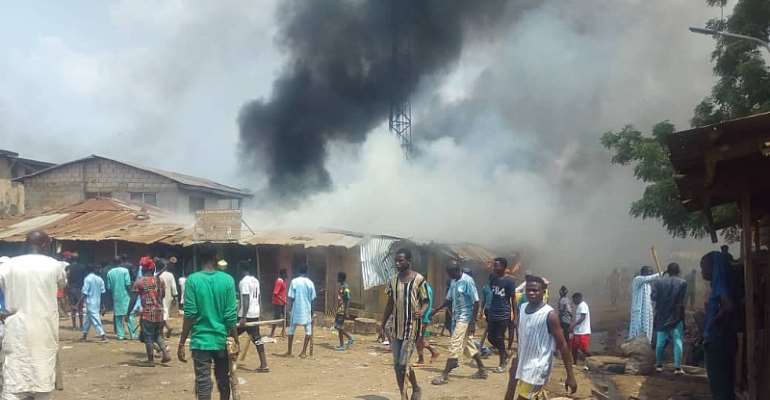Shasha Crisis and Nigeria's relentless pursuit of peaceful coexistence: a myth or reality?

Just at the early hours of the week, news and mediaagencies reported of a clash in the Shasha markektlocated in Akinyele Local Government, Oyo State,southwestern Nigeria. Though the details of the clash arestill sketchy, it was revealed that the clash was alongethnic and tribal lines. Properties and lives were lost on aquantum level.
It is obvious and unarguable that Nigeria which is one of the most populous countries in the world is made up of several ethnic groups and tribes. These are scattered across the entire 36 States and the Federal capital territory.
From the standpoint of truth, one would have thought that these division along ethnic and tribal lines will be used as a verifiable tool in bringing the entire country together in achieving the common purpose of installing peace, unity and development. But contrary to popular belief, the prime bane of our country's development has been the unwillingness to accommodate other tribes and to entrench the mantra of peaceful coexistence. Ours therefore is not unity in diversity but diversity in disunity.
From the period shortly after independence in1960 uptill now, the drum beats of allowing for peaceful coexistence has what has been sung into our moral consciousness. This has been through various methods. Such include the national anthem of which the last line of the first stanza says one nation bound in freedom, peace and unity, the National Youth Service Corps which is meant to inculcate into the minds of Nigerian youths the essence of patriotism and selfless service cum oneness, the federal character commission which is a Federal agency working towards ensuring that all tribes have a slot in federal appointments.
As laudable as all the above initiatives may be, it has overtime not been able to achieve the desired objectives. The resultant effect of this has been conflicts, wars and the likes. From the Aba women crisis to the Jos crisis, the OffaErin-ile crisis, the Tiv Jukun Crisis and others which the pages of this paper may not be able to contain.
The above crisis which seems to be as infinitum have been the poser to the question which js: How realistic is Nigeria's pursuit for peaceful coexistence? Should the pursuit be regarded as a myth or a reality?
The recent crisis in Oyo State has totally revealed the level of which Nigerians have failed to accommodate each other and be each other's brother's keeper. This may be the reason many have opined that peaceful coexistence may not be something the nation will be able to achieve within the shortest possible time.
But who takes the blame for all these mayhem?
Do we blame the current crop Nigerian leaders who have whimsically infused into the mental stream of Nigerians that some animals are greater than others as aptly captured in George Orwell's Animal Farm? This is through mediocre appointments concentrated only in a particularaxis or region? Or we blame it on our colonialists who united the northern and southern protectorates of the country?
What about the disrespect for the fundamental human rights, the rule of law and the principles of democracy which has led to colossal damage within the national system? Are these not enough proofs to substantiate the fact that peaceful coexistence will continue to be a myth and not something realistic?
We all are conversant with the fact that Nigeria is highly volatile and at the slightest provocation, everyone will troop to the streets to fight for his or right. The ripple effect of this is such that cannot be measured using any standard procedure.
More often than not, the issue of state of origin has done more harm than good. This is evident in the process of doing out appointments and electing national officials.
Our country is one where trifle and infinitesimal actions are interpreted along ethnic lines. It is a country operating on a fragile and faulty structure such that more still needs to be done with respect to harmonising the populace and engendering harmony and peaceful coexistence.
It is worrisome that a person from a particular tribe cannot live in another state inhabited by people from another territory without entertaining fear. Little wonder interthnic marriages is gradually been eroded and becoming a thing of the past. What claim do we have that peaceful coexistence is applicable in our context when the above issues continually rear up their ugly head.
Until everyone sheaths his or her sword, embracing peaceand accommodating all irrespective of tribe or race, our quest for peaceful coexistence will continue be a teaching or sermon operating only in theoretical terms.
The orders of evictions are the consequences of ouractions. This according to elders and scholars are thebeginning of another civil war of which the country may notbe able to recover from. If we are still struggling to recover from the shock of the war in the 60s, what evidence can we lay claim to that we survive of Nigeria breaks up?
Understanding the need for peaceful coexistence should be the mantra on our lips. The earlier we do this, the better for us all.
